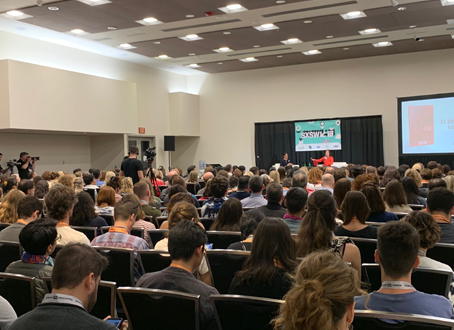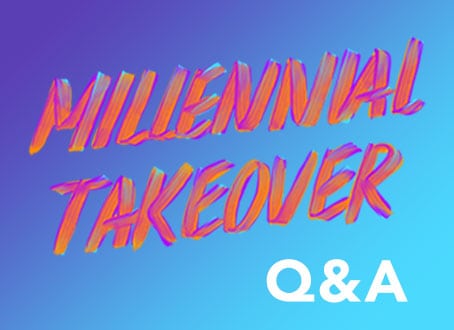The release of the Millennial Impact Report: 10 Years Looking Back celebrates over a decade of research the Case Foundation led focused on increasing our understanding of how millennials connect, give and involve themselves with social and political causes. More than ten years ago, millennials were branded as “Generation Q”–a quiet, inactive, insular group that did not engage with social causes and were often considered self-centered, lazy and too concerned with their devices to think about anyone else. Yet, as a parent of millennials and with a staff largely comprised of engaged members of the generation, this stereotype didn’t ring true. Wasn’t this also the generation that brought us game-changing companies like Airbnb, Instagram and Lyft, and helping to power movements like Giving Tuesday? It was clear we needed to take action to search for ways to ensure that this 80 million strong cohort could be motivated to make a positive impact on the world.
With this in mind, we launched the Millennial Impact Project to learn more about this generation and how they thought about doing good. Together with our partners at Achieve, we surveyed more than 150,000 millennials over the decade, generating one of the most robust data sets on millennials to date. The release of today’s report is the culmination of this decade-long focus on millennials and their attitudes toward social change.
We learned a lot. In particular, we found that millennials are thinking, acting and living their lives like no other generation before them, bringing a more holistic approach to using their time and resources to make a difference. They think about making change across a continuum from the purchasing decisions they make at the supermarket to the petitions they support on social media and the social good opportunities they incorporate into their work. And, in a counterpoint to the “Generation Q” stereotype that sparked the Case Foundation’s interest in learning more about this impactful generation, the research shows a commitment to partnerships and working together, with respondents saying they are more likely to donate if a coworker asks, more likely to volunteer if a coworker also is volunteering. Indeed such as in movement-building, they see their actions, even if they are small, having an impact if they are in concert with a larger active group. These changes in behavior and the breaking down of traditional barriers, coupled with the technological tools that are commonplace, requires everyone–from the social sector seeking their donations, to employers who want to attract and retain talent, and companies that count on millennial consumers to purchase their products–to be nimble, curious and constantly open to revising and improving approaches. As I said when we released our 2014 report on millennials in the workplace, “Millennials are in the business of doing good.”
After a decade of research on millennials, it is clear that the generation is not a monolith, with many different groups in different stages of life, coming from wide-ranging of points of view and interests in activism. And it is important to remember that the oldest millennials are now coming up on 40 — a good reminder that the oldest segment of this generation is raising families now, owning homes and building serious careers. One of the key learnings we take away from this work is to be very wary of those who seek to characterize all of the sentiments and intentions of a generation of over 80 million individuals, particularly with the millennial generation, in a few broad statements or phrases. With that in mind, the decade of research the Case Foundation has led provides important insights into how many in the generation view social change and can provide key guidance to those–millennial or not–who want to engage more people in their efforts to make an impact on the world. Here are a few of the key takeaways:
- Millennials Believe All Assets are Equal: They believe their time, skills, talent, money, voice, purchasing power and ability to network all have equal value, and they offer them as such. This generation does not prize being a financial donor above being a volunteer or activating their peer network as more valuable than signing a petition. When they are inspired to do something, they see their behavior (no matter what it is) as significant support.
- Millennials are Passionate About Issues, Not Institutions: “Millennial donors are not committed to one single organization; they are more committed to a cause,” according to Justin Wheeler, Funraise CEO. “So, their loyalty is to an issue they care about or are passionate about. And whether they give money or volunteer, it’s not necessarily directed at one organization.” More than 90 percent of millennials said they would stop giving to an organization if they began distrusting it. In a reflection of that trust, more than three-fourths would stop giving if they aren’t told how their contributions help.
- Millennials are Influenced by Their Peers: This trend has been seen across many years of our millennial research as millennials have consistently reported that they often invite friends to join their volunteer and fundraising efforts and are more likely to engage in a cause if their peers are already participating.
- Millennials Support the Greater Good, Not Partisan Politicking: Millennials are both empathetic to the needs of others and discontented with the status quo. They want situations and conditions that are worsening peoples’ lives to be fixed, but they distrust the government to address social ills effectively. In particular, they expressed no trust at all in the government’s ability to address key social issues like poverty (33%), race and culture (32%) and student loans (30%). Millennials are also impatient with bipartisanship and politicking–a major reason they are developing their own ways to inspire and affect public policy change.
- Millennials Believe in Activism: While millennials often come to activism from a different starting point, they continue to believe in tools of traditional activism, such as voting, petitions, protests and marches. In 2017, voting topped the list of the most actions taken by millennials and the action they deemed most likely to be influential; 71 percent responded with voting as activism.
- Millennials Believe All Actions Matter–Big and Small: Millennials have engaged in causes back and forth across the spectrum–some remain at the micro-level of involvement, some move to leadership roles and many move within the space in between. One significant, unique notion supported by 10 years of research is that millennials acting in small ways individually often create leverage as a large, active group capable of influencing great change.
As you can see, many of our findings show that millennials are not just trying to change the world, they are actually changing the way that social change is made. Some of these changes may make traditional players uneasy and raise questions about effectiveness, but by acting as force multipliers for the world of cause engagement and social good, and by matching their actions with the times, millennials are changing the communities around them. The nonprofits and companies that successfully engage this group and respond effectively to this new way of pushing for social change will ultimately be better positioned to harness the energy and passion of this large generation. We hope that the summary of insights that we have learned over the past decade will help leaders from all generations work together to make a real impact. You can read the full report here.




